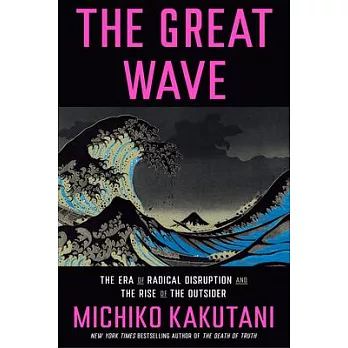我們正處於一個激進變革的時代。
曾被視為激進、非正統、非主流的強大聲浪,
正在打破政治、商業和文化的現狀,
帶來更多的機會和風險。
本書作者角谷美智子,是榮獲普立茲獎的資深書評家,曾任《紐約時報書評》首席評論家,暢銷書作有《大說謊家時代》(The Death of Truth)。
自2008年全球金融危機以來,人們對機構和領導的菁英階級的逐漸產生不信任感,試圖以各種數位工具繞過傳統的門戶守衛者。社會和經濟不平等,激起世界各地民眾的憤怒感,惡質的黨派對立型態正在破壞民主理念,有心人士使用網路和AI,快速傳播各種假訊息,形成當今混亂、不穩定的局面。曾被視為激進、非正統、非主流的意見,形成一股又一股益發強大的新聲浪,打破了政治、商業和文化的現狀。
角谷美智子以廣泛的視角、犀利的文筆,洞察現今政治、科技和文化等各面向,呈現當下激烈變革的時代。儘管危機接踵而來,在痛苦中仍應懷抱希望,作者在書中指出兩條有助重新穩定局勢的主要途徑,有助在動盪中尋求轉機,讓世代通往永續的未來。(文/博客來編譯)
An urgent examination of how disruptive politics, technology, and art are capsizing old assumptions in a great wave of change breaking over today’s world, creating both opportunity and peril--from the Pulitzer Prize-winning critic and author of the New York Times bestseller The Death of Truth.
"In this dazzling and brilliant book, Michiko Kakutani explains the cascading chaos of our era and points to ways that we can regain some stability."--Walter Isaacson, author of Elon Musk
The twenty-first century is experiencing a watershed moment defined by chaos and uncertainty, as one emergency cascades into another, underscoring the larger dynamics of change that are fueling instability across the world.
Since the global financial crisis of 2008, people have increasingly lost trust in institutions and elites, while seizing upon new digital tools to sidestep traditional gatekeepers. As a result, powerful new voices--once regarded as radical, unorthodox, or marginal--are disrupting the status quo in politics, business, and culture. Meanwhile, social and economic inequalities are stoking populist rage across the world, toxic partisanship is undermining democratic ideals, and the internet and AI have become high-speed vectors for the spread of misinformation.
Writing with a critic’s understanding of cultural trends and a journalist’s eye for historical detail, Michiko Kakutani looks at the consequences of these new asymmetries of power. She maps the migration of ideas from the margins to the mainstream and explores the growing influence of outsiders--those who have sown chaos and fear (like Donald Trump), and those who have provided inspirational leadership (like Ukraine’s president Volodymyr Zelensky). At the same time, she situates today’s multiplying crises in context with those that defined earlier hinge moments in history, from the waning of the Middle Ages to the transition between the Gilded Age and the Progressive Era at the end of the nineteenth century.
Kakutani argues that today’s crises are not only signs of an interconnected globe’s profound vulnerabilities, but also stress tests pointing to the essential changes needed to survive this tumultuous era and build a more sustainable future.



 天天爆殺
天天爆殺  今日66折
今日66折 























 博客來
博客來 博客來
博客來 博客來
博客來 博客來
博客來 博客來
博客來